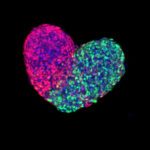Lien vers Pubmed [PMID] – 32348719
Biophys. J. 2020 Apr;
Bacterial chemotaxis, the directed migration of bacteria in a gradient of chemoattractant, is one of the most well-studied and well-understood processes in cell biology. On the other hand, bacterial thermotaxis, the directed migration of bacteria in a gradient of temperature, is understood relatively poorly, with somewhat conflicting reports by different groups. One of the reasons for that is the relative technical difficulty of the generation of well-defined gradients of temperature that are sufficiently steep to elicit readily detectable thermotaxis. Here, we used a specially designed microfluidic device to study thermotaxis of Escherichia coli in a broad range of thermal gradients with a high rate of data collection. We found that in shallow temperature gradients with narrow temperature ranges, E. coli tended to aggregate near a sidewall of the gradient channel at either the lowest or the highest temperature. On the other hand, in sufficiently steep gradients with wide temperature ranges, E. coli aggregated at intermediate temperatures, with maximal cell concentrations found away from the sidewalls. We observed this intermediate temperature aggregation in a motility buffer that did not contain any major chemoattractants of E. coli, in contradiction to some previous reports, which suggested that this type of aggregation required the presence of at least one major chemoattractant in the medium. Even more surprisingly, the aggregation temperature strongly depended on the gradient steepness, decreasing by ∼10° as the steepness was increased from 27 to 53°C/mm. Our experiments also highlight the fact that assessments of thermal gradients by changes in fluorescence of temperature-sensitive fluorescent dyes need to account for thermophoresis of the dyes.


